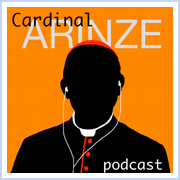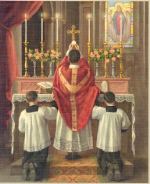1st Sunday after Easter - Prudence
"He showed them his hands and his side." St. John, 20:20.
Our streamliner was standing outside the Union Station at Kansas City, waiting to get in. Across several tracks I watched a freight train slowly pulling out of the yards. On the top of a boxcar was a brakeman walking along toward the back of the train. Suddenly I noticed him crouch down, step quickly over to the end of the car, and climb a few rungs down the side. It looked as if there was something wrong, but gazing more closely I noticed hanging over the tracks a sort of skein of small ropes stretched in such a way that at least one of them will harmlessly strike any trainman who may happen to be standing or walking on the top of a moving freight car. And sure enough, a short distance away there was an overpass or overhead bridge.
One could figure that the distance between the lower part of the bridge and the top of the cars was great enough to allow a man sitting on the roof to pass under safely. But there was not enough room for a man standing or walking. On each side of such a bridge you will find these small ropes hanging over the tracks some yards away to warn trainmen that they can't clear it standing up.
Nevertheless, though trainmen know that they can clear it sitting down, I have never seen a railroader ride under a bridge of that kind sitting on top of a car. They always climb down the end of the car or down the side. They want to play safe, absolutely safe. They want to take no chances. They want to be on the safe and prudent side.
Such prudence is a part of daily life. It is a most important part of spiritual life. Prudence is the first of the four cardinal virtues, the four virtues on which hinge and hang all the others. Prudence is so helpful and so necessary that we might spend some time thinking about it.
Prudence is that virtue or power of the mind which sees how to act and when to act in order to do the will of God. Prudence tells us what, in a particular case, is the better way to act according to the wish of God. It is necessary even in material matters, like starting a business or guiding a ship. The trainman I saw atop the cars hurrying to a safe spot was exercising prudence.
1. Prudence does two things:
A. It sees clearly what is right and what is wrong in a given case. It sees, for example, that a certain movie is an occasion of sin, that coming late to Mass is a scandal and discourtesy to others. Too many fail in prudence by trying to reason themselves into thinking that something is not sinful, or that it is only venially sinful. They hear us declare, on the word of God and God's Church, that certain things are mortal sins. But they do not have the prudence, the mental power to accept and admit that certain things are right and certain things wrong.2. Prudence uses a lot of helper virtues:
B. The second task of prudence is to find the best means to accomplish the good and avoid the evil. Let me illustrate: You may be one of those half-hearted Catholics who comes late to Mass more often than he does on time. Do something to avoid such impolite tardiness. Have someone call you. Set your alarm ten minutes earlier. Again: you know that a certain person is an occasion of sin to you. Avoid that person, or be prepared for the occasion.
A. Good counsel tells us to ask for and use the advice of our priests, parents, teachers, and authorities.3. Sins against prudence fall into two classes:
B. Common sense, which is so very uncommon, is the power and practice of judging as directly and accurately as possible.
C. Foresight is the ability to see possible difficulties, opportunities, needs, and means.
D. Impartiality is a sort of holy indifference to the consequences.
E. Caution is the practice of noticing and avoiding obstacles and hindrances to right action.
A. Those which result from insufficient prudence-In a certain sense, the doubting disciple of whom we read today had too much prudence, prudence of the wrong kind. St. Thomas would not believe, apparently, the promise of Christ that He would arise; he would not believe the other Apostles when they said they had seen the Lord. He was reserving judgment imprudently and needlessly.i. Acting impulsively and without thinking.B. Sins which result from too much so-called prudence:
ii. Choosing means or helps without sufficient thought.
iii. Inconstancy, that is, changing our decision or plan with little or no reason.
iv. Laziness or negligence which means that we do not exert ourselves to carry out the plan after we have made it.i. What is often called prudence of the flesh, namely being too much concerned with temporal goods, with honors, comforts, and the respect of others.
ii. Cunning, either in words or actions; using wrong methods to obtain a good purpose.
iii. Worrying about the things of this world.
iv. Worrying about the future to such an extent that you distrust the care of God.
Anyone can see how important prudence is in spiritual life. It means taking the safer course. The trainman of my story took the safer course. He might have been safe sitting on top of the boxcar, as it went under the bridge. He took no chances. He got off the top to be absolutely safe.
May we use the same prudence in working for heaven. May God give us the help to see clearly what is right and what is wrong, and then may He give us the means to do what He wants. As the Psalmist sang: "Show, O Lord, Thy ways to me and teach me Thy paths." Ps. 24:4.
________________________
Adapted from Prayers, Precepts and Virtues
by Fr. Arthur Tonne, OFM (©1949)










